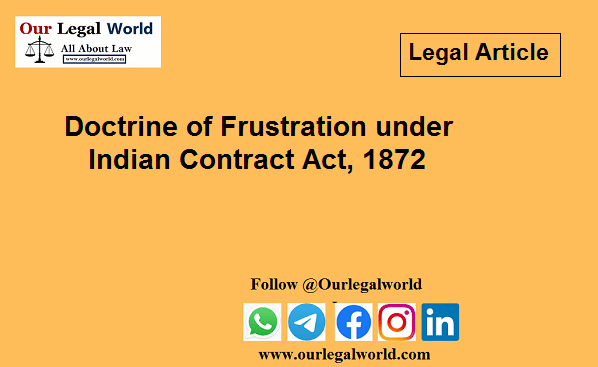Doctrine of Frustration under Indian Contract Act, 1872: Our Legal World
Introduction-
We human beings at least once get involved into a contract throughout our whole life. The most common instance of contract is buying-purchasing transactions. Breach of contracts by any of the party have been recorded many a time due to which the contract does not comes into the effect or the breacher has to pay compensation for the breach of the contract2. In some of the cases, it is possible that a contract gets terminated without any breach. This happens when any unforeseen mishappening takes place which directly or indirectly blocks the functioning of a contract. This kind of circumstance can be found under the doctrine of frustration. In general, term ‘frustration’ means to ‘counter the progress of anything’; alike in the Indian Contract Act, this element prevents the fulfilment of a contract.
What is ‘doctrine of frustration’?
When the performance of a contract is interrupted not because of the faulty parties but due to the unseen event occurred before the completion of the contract, this is the case of frustration in a contract. The parties are not accountable further the frustration happened to the contract, but are responsible for their performance before the interruption. This doctrine is contained in the Section 56 of the Indian Contract Act, 1876. These kinds of event are unpredictable for the promissor or the pomissee. Eventually, they make a contract void.
This doctrine is based on the maxim “Lex non cogit ad Impossibilia” which means “Law does not compel the Impossible”. This doctrine includes both the interruption in the contractual obligation and the sole purpose of the contract. This doctrine is applied into the situations where (a). the performance is physically discontinued and (b). the object has failed.
Example-
A entered into a contract with B, to buy B’s horse. They both agreed for the sale but before the commencement of the contract, the horse died. The reason was unknown to B. Hence, the doctrine of frustration applied in this case. The contract considered as void with effect to the day, when the horse died. B was not liable for the loss of A.
Elements of the ‘Doctrine of Frustration’-
• There is a valid contract between the parties.
• The purpose contract is yet to accomplish.
• The contract becomes impossible to perform.
• The impossibility of performance caused by the circumstances are beyond to the control of both of the parties.
• It suspends the rights and liability of the parties after the impairment in the contract.
Doctrine of Frustration in India-
The doctrine is envisaged in the section 56 of the Indian Contract Act, 1872. Though, it is impliedly mentioned in the section. The doctrines of initial impossibility and the subsequent impossibility includes the theory of frustration. The initial impossibility describes that any contract which can’t be performed is void ab initio. The subsequent impossibility constitutes the doctrine which lays down that, a contract which is formulated but before the commencement something happens which hampers the completion of contract, the case becomes void. It covers an ambient position in the Indian legal system.
Also Read: Important Doctrines and Their Applicability on Indian Constitution with case laws
In the remarkable case of Satyabrata Ghose v Mugneuam Bangur3, the judge held that the frustration is equivalent to the impossibility. The changed circumstances make the performance of the contract impossible and the parties are absolved from the further performance of it as they did not promise to perform impossibility.
This doctrine is based on the maxim ‘Lex non cogit ad Impossibilia’ which means ‘Law does not compel the Impossible’. Such condition is implied to all kinds of contract.
Case of ‘Taylor v. Caldwell4’-
This is one of the most significant cases based on this doctrine. In this case, Caldwell owned a music hall which he agreed to give on rent to the Taylor to use, which the latter planned to use for 4 concerts. A week before the first concert, the hall was set to ablaze to the grounds. The plaintiff sued the owner of the hall for the breach of the contract.
Blackburn J. held that, the permanent existence of the hall is the necessity for the completion of the contract. The destruction of the hall was not at the fault of any of the parties. Moreover, he cited the legal code of France and Roman law which reasoned that, for the completion of the contract, the existence of a particular thing is necessary. Henceforth, he held that both the parties were free from the obligation of the contract.
Some instances of Frustration-
- Grant of an injunction.
- Non-occurrence of a particular event.
- Destruction of the subject.
- Outbreak of war.
Some instances of No Frustration-
- Financial Crisis
- Occurrence of bad weather.
- Difficulty in interpreting the terms of the contract.
- Event causing carriage of goods by sea more expensive.
Effects of Frustration-
- The contract becomes void. No party remains obliged afterwards the event causing the impossibility of the contract.
- Remedy of restitution.
- Under section 66- Mode of communicating or revoking rescission of voidable contract.
- Under section 15(2) & (3) of the Civil Law Act 1956.
Conclusion
When two parties enter into a contract, they are expected to oblige accordingly to the terms of the contract. From the offer made to the purpose attained, the parties remain accountable. The impossibility caused by the one party is said to be the breach of the contract. The party at fault becomes liable to the other party. But in some cases, subsequently events take place which make the happening of the contract impossible. This impossibility is mentioned in the doctrine of frustration. It makes both the parties free from liability, as the interruption was unforeseen to them and no one knew about it from the beginning till the happening. This doctrine is meant for the protection from the harassment to the innocents.
Author: Vasudha Priyansha is a 3rd year under graduated student of integrated B.Com Llb pursuing from MMU, Ambala.
_________________________________________________________________________
- See section 74 of the India Contract Act, 1872.
- [1954 SC]
- [1863] EWHC QB J1, (1863) 3 B & S 826, 122 ER 309
References
- Singh Avatar- Contract & Specific Reliefs
- www.legalservicesindia.com
- www.mondaq.com
- www.blog.ipleaders.in
- www.lawcorner.com
- www.enterslice.com







